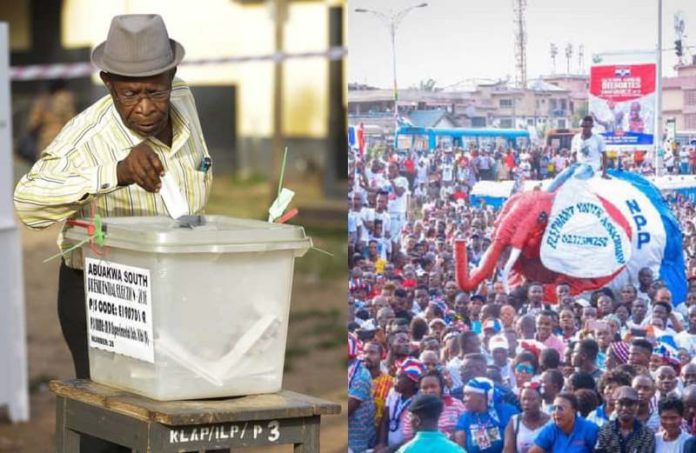
Four political scientists have separately said that last Saturday’s Special Electoral College Election of the New Patriotic Party (NPP) may have little reflection on what lies ahead in the main presidential primary of the party on November 4 this year.
They are Dr George Asekere of the University of Education, Winneba; Prof. Edward Brenya of the Kwame Nkrumah University of Science and Technology (KNUST); Dr Richard Asah-Asante and Prof. Ransford Gyampo, both of the University of Ghana, Legon.
Prof. Brenya, who heads the History and Political Science Department of KNUST, said last Saturday’s poll was not necessarily a reflection of what would happen in the party’s presidential primary on November 4.
The Special Electoral College Election was held to prune the party’s flagbearer aspirants from 10 to a maximum of five, with Vice-President, Dr Mahamudu Bawumia; the Member of Parliament for Assin Central, Kennedy Ohene Agyapong; a former Minister of Trade and Industry, Alan John Kwadwo Kyerematen, and a former Minister of Food and Agriculture, Dr Owusu Afriyie Akoto, securing the first four slots in that order.
The party will decide on a fifth candidate at a poll between a former Energy Minister, Boakye Agyarko, and former MP for Mampong in the Ashanti Region, Francis Addai-Nimoh, who secured nine votes each in fifth place.
“This will not be a reflection of what will take place in November because that will involve the generality of the masses whose preferences may be totally different from the Super Delegates Conference,” Prof. Brenya told the Daily Graphic yesterday.
He said against the backdrop that most of those who voted last Saturday were government appointees and could easily be “pushed”, the November 4 election could be a totally different ball game.
“Don’t forget the alleged vote-buying by some people and the allegation that the Vice-President, in particular, bought vehicles for some officials; same could not be done in November because the number will be huge,” he said.
The political scientist said he could foresee the culture of “joining the queue till it gets to one’s turn” within the party still playing out.
Prof. Brenya said much as he was surprised by the second place performance of Mr Agyapong, “the entire process was not entirely surprising”.
“The outcome was not really surprising but it was Alan’s performance that was really shocking, especially in the Ashanti Region where Dr Bawumia took almost all the votes.
“I think it was more than 90 per cent.
“That for me was the shock.
“But I see him doing better, and Mr Agyapong causing some stir,” he said.
For Prof. Ransford Gyampo, of the Political Science Department of the University of Ghana, “nothing is surprising about the placements” of the first three candidates in the NPP Super delegates Conference.
“The majority of the delegates were “politically made” by the establishment and their continuous stay in office as appointees, and even as elected people, is based on the support of the establishment.
They couldn’t have varied their votes,” he said in a Facebook post.
“Ken Agyapong also garnered his kind of great show among those who felt they could get his support in terms of money in their future electoral and political endeavours.
He could be a kingmaker and would easily nominate some of these guys for positions.
But what makes him a serious force in the future is that, he is also a very much grass-roots person.
“So, our Vice-President Dr Bawumia cannot be complacent because the real kingmakers will be at the grassroots where both Alan and Ken are likely to make huge incursions, according to very scientific data on the NPP delegate preferences.
He, Alan and Ken must, therefore, work harder,” he added.
Prof. Gyampo said the future of the NPP presidential aspirant race was heavily pregnant with uncertain possibilities, stressing that “more work must be done by the Vice-President to get to the grassroots; more work must be done by Alan to win more people at the top as he’s likely to put up a better show among the grassroots in November; and Ken must work harder to appeal to both segments of the delegates”.
He, however, argued that “those who have just voted can still change their mind towards any direction”.
The Vice-President secured 629 votes, representing 68.15 per cent; while Mr Agyapong had 132 votes, representing 14.30 per cent.
Mr Kyerematen secured 95 votes, representing 29 per cent, while Dr Akoto had 36 votes, representing 3.90 per cent.
Party cohesion
Dr Asekere said the quest to minimise acrimony and defections after the presidential primaries, was perhaps, the most convincing reason for the Special Electoral College Election.
“It is an uncharted path, and it was normal to expect some of the challenges.
The conference was largely a success.
However, as the party that prides itself as a liberal democratic party espousing democratic tenets, it was disappointing to observe some of the scenes.
“It looks clear that although the winner was destined to win, the alleged use of money and perhaps the established mechanism to frustrate other candidates was unfortunate.
The use of violence in the full glare of helpless police officers was a dent on both the party and the Ghana Police Service,” Dr Asekere said.
He said going forward, some of the strategies, for instance, the decentralised voting system that appeared to have been an intimidating ploy to other candidates, the inclusion and exclusion criteria of the about “927 selectorate”, should be reviewed.
Dr Asah-Asante said the election was fought on 10 factors, namely establishment/incumbency advantage, resources, strategy, message/ideas, loyalty, competence, the structure of the voting body, political will of the candidates, their popularity and achievements.
- John Boadu drops shocking revelation about NPP presidential aspirants
- Election 2024: Lilwin eyes Afigya Kwabere South seat
- Mahama makes key appointments in NDC; check out list

